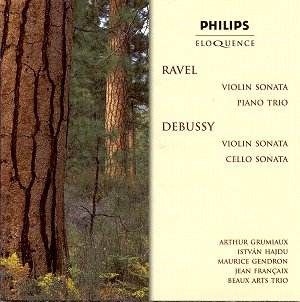This disc of recordings originally released within
a four-year period, between 1962 and 1966, enshrines some of the very
greatest performances of their kind. Grumiaux’s partnership with Istvan
Hajdu bore remarkable fruit; Gendron and Francaix were nonpareil sonata
partners and the Beaux Arts Trio - Guilet, Greenhouse and Pressler -
were at the top of their form. It makes for one of the most comprehensively
satisfying couplings in the catalogue and, nearly forty years on, every
bit as desirable as on first issue.
The Violin Sonata receives a reading that fuses the
aristocratic with the more visceral. Grumiaux’s bleached tone in the
first movement – withdrawn and interior – is entirely apposite and never
expressively exaggerated. Hajdu’s playing is rhythmically acute and
pointed – listen to the passage at 5’20 when balancing with the violin’s
lower strings and accommodating Ravel’s quirkier writing. There is some
succulent but not abandoned playing in the Blues, the second movement,
and their sense of the work’s continuities ensure a performance that
is integrated rather than outrageous, complete rather than fractured
into individual felicities. I especially admired the tremendous vigour
of the finale without at any moment sacrificing beauty of tone or steadiness
of purpose. This is real sonata playing and still one of the very best
available accounts.
Grumiaux’s elevated intellectual profile is put to
exalted use in the Debussy Sonata. He has a quicksilver response to
the music’s twists and turns and an alertness to the necessary momentum
in the first movement. He is thus forward moving but flexible with a
fast vibrato and multi variegated tonal response at once apposite and
unostentatious. Listen at 2.15 to about as extravagant a portamento
as he ever made on disc. If you want to hear fluent and incisive duo
playing listen to Grumiaux and Hajdu in the Intermède where
understanding of motivic details and larger structure reigns supreme.
So too in the finale; just the right weight of bow pressure from the
violinist at 1.40 and the optimum fluidity and fluency from the pianist.
A noble account of a masterpiece. Time is right for a reappraisal of
the Gendron-Francaix partnership, in my view every bit as exalted an
instrumentalist-composer duo as the better known and more fêted
Rostropovich-Britten. I recently reviewed a performance of the Debussy
Cello Sonata by a celebrated contemporary duo so narcissistic as to
be painful. Here, at a somewhat steadier tempo, but not by much, Gendron
and Francaix show how inflection, nuance, tonal variety and cogency
bring rewards far outstripping the mere superficialities of the moment.
There is such expressive propriety to their playing. In the pizzicato
episode of the Serenade’s opening everything is at the service of the
music and the gradations of tone in the subsequent development are of
sovereign subtlety. And such wit – real wit, not supposed Gallic "wit"
– in the slides and phrase endings, such triumphant understanding of
the work’s architecture and meaning, such involved nonchalance. In the
finale their sense of anticipation and release is second to none. There
is never any vulgar overemphasis in tempo relation. Gendron’s tone colours
here are infinitely attractive and subtle and the whole performance
a triumph of selfless musicality. The Beaux Arts Trio have since re-recorded
the Trio, a performance I’ve not heard but which is greatly admired.
Their 1966 traversal is quite outstanding. The ebb and flow is maintained
in the tricky opening movement, from the elfin to the more dramatic
outbursts; there is a sense of controlled passion in the Pantoum
whilst the affectionate understanding they bring to the third movement
Passacaille is remarkable enough were their phrasing not so utterly
right. The trio’s ensemble in the finale, with the piano’s incendiary
little bass voicings, is remarkable. Well-balanced, climactic, cultivated
– in profile not unlike Grumiaux’s own sense of elevated music making
- the Beaux Arts are special exponents of the Trio.
As a recital of major French chamber works this disc
doubtless has its rivals; others will be in more opulent acoustics,
others will have more garish cover art work, others will be more widely
publicised; others will be more assiduously promoted. None will be better.
There is simply no substitute for this kind of elevated music making.
This is quite simply a superb disc.
Jonathan Woolf
AVAILABILITY
www.buywell.com


